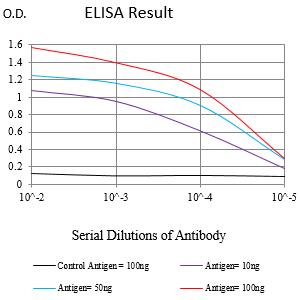
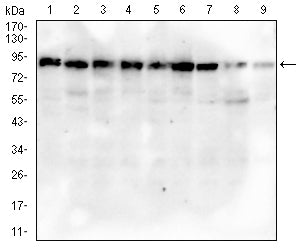
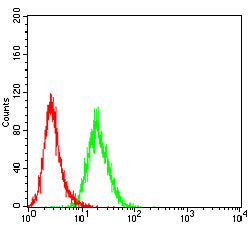
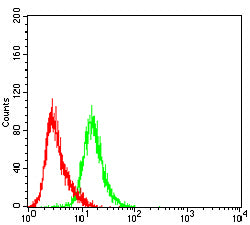
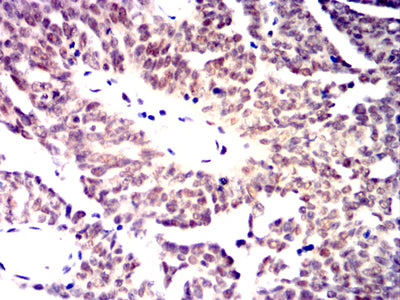
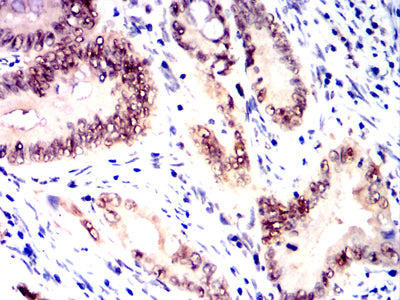
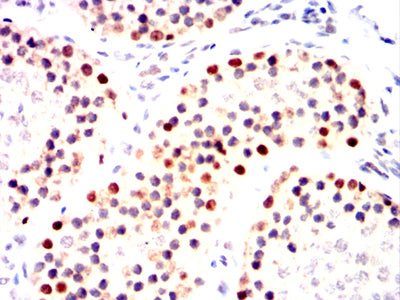
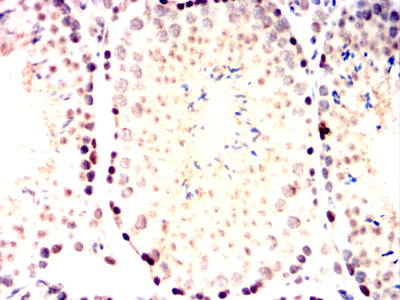
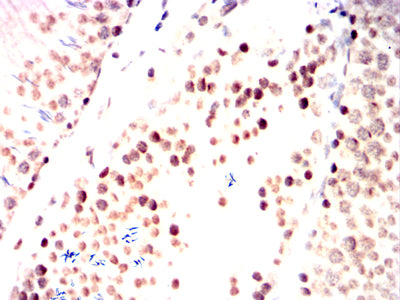
| WB | 1/500 - 1/2000 | Human, Mouse, Monkey, Rat |
| IF | 咨询技术 | Human, Mouse, Monkey, Rat |
| IHC | 1/200 - 1/1000 | Human, Mouse, Monkey, Rat |
| ICC | 技术咨询 | Human, Mouse, Monkey, Rat |
| FCM | 1/200 - 1/400 | Human, Mouse, Monkey, Rat |
| Elisa | 1/10000 | Human, Mouse, Monkey, Rat |
| Aliases | ATLD; HNGS1; MRE11A; MRE11B |
| Entrez GeneID | 4361 |
| clone | 7C8A9 |
| WB Predicted band size | 80.6kDa |
| Host/Isotype | Mouse IgG2b |
| Antibody Type | Primary antibody |
| Storage | Store at 4°C short term. Aliquot and store at -20°C long term. Avoid freeze/thaw cycles. |
| Species Reactivity | Human, Mouse, Monkey, Rat |
| Immunogen | Purified recombinant fragment of human MRE11 (AA: 182-582) expressed in E. Coli. |
| Formulation | Purified antibody in PBS with 0.05% sodium azide |
+ +
以下是关于MRE11抗体的3篇参考文献及其摘要概括:
1. **文献名称**:MRE11 expression as a prognostic and predictive marker in colorectal cancer
**作者**:Smith A, et al.
**摘要**:该研究利用MRE11抗体通过免疫组化技术分析结直肠癌组织中MRE11蛋白的表达水平,发现高表达MRE11与患者术后生存率改善相关,提示其可作为预后标志物。
2. **文献名称**:Characterization of MRE11 Antibodies for Western Blot and Immunofluorescence
**作者**:Brown C, et al.
**摘要**:文章系统评估了多种市售MRE11抗体的特异性与灵敏度,通过Western blot和免疫荧光验证其在DNA损伤模型中的应用,为实验选择合适抗体提供依据。
3. **文献名称**:Functional Analysis of MRE11 in DNA Double-Strand Break Repair
**作者**:Zhang L, et al.
**摘要**:研究利用MRE11抗体沉默细胞模型,结合免疫沉淀技术阐明MRE11-RAD50-NBS1复合物在修复DNA双链断裂中的分子机制,揭示其与基因组稳定性的关联。
4. **文献名称**:MRE11 Deficiency in Neurodegenerative Disorders: Antibody-Based Detection in Patient Samples
**作者**:Yamamoto K, et al.
**摘要**:通过MRE11抗体检测神经退行性疾病患者脑组织样本,发现MRE11蛋白表达降低与神经元DNA损伤累积相关,提示其可能参与疾病病理过程。
(注:以上文献信息为示例性概括,实际文献需通过学术数据库检索获取。)
The MRE11 antibody is a crucial tool in studying the MRE11 protein, a central component of the MRN complex (MRE11-RAD50-NBS1), which plays a pivotal role in DNA damage response and repair. MRE11 exhibits endonuclease and exonuclease activities, facilitating resection of DNA double-strand breaks (DSBs) to enable homologous recombination repair. It also activates the ATM kinase, a master regulator of the DNA damage checkpoint. Dysregulation of MRE11 is linked to genomic instability, cancer predisposition, and genetic disorders like ataxia-telangiectasia-like disorder (ATLD).
MRE11 antibodies are widely used in research to detect protein expression, localization, and functional interactions via techniques such as Western blotting, immunohistochemistry (IHC), and immunofluorescence (IF). They aid in investigating MRN complex dynamics, DNA repair mechanisms, and cellular responses to radiation or chemotherapeutic agents. In clinical contexts, these antibodies help assess MRE11 expression levels in tumors, potentially serving as biomarkers for cancer prognosis or therapeutic response.
Commercial MRE11 antibodies are typically raised against specific epitopes, with monoclonal antibodies offering high specificity and polyclonal antibodies providing broader detection. Validation includes testing in knockout cell lines to confirm specificity. Researchers prioritize antibodies with proven reactivity in their experimental systems to ensure reproducibility. Given MRE11's role in maintaining genome integrity, its antibody remains indispensable for advancing studies in molecular oncology, radiobiology, and DNA repair therapeutics.
×